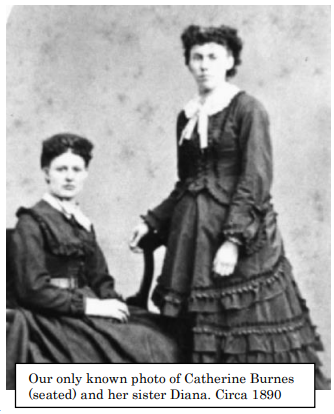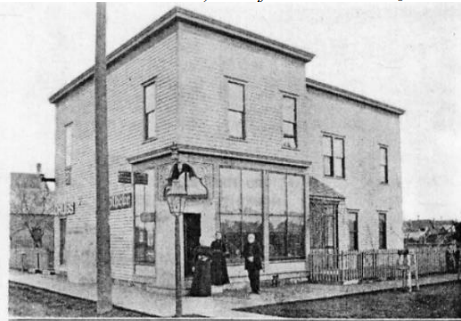This history lesson comes from one of our newsletters. Newsletters are a benefit of membership with the Hopkins Historical Society. Learn more here: |
Catherine Amelia Burnes - "Doc Kate"
Hopkins' First Doctor
by Mary Raabe
first published in 2018
|
“Dr. Catherine Burnes carried good health and good cheer to the firesides of hundreds of old settlers, whom she never failed in their hour of need and sickness.” - James Markham, Editor, Hennepin County Review December 15, 1932
Everyone in town knew her as Doc Kate. From 1886 to 1892 she was the only doctor in Hopkins. Catherine Burnes was the first female to receive a medical degree from the University of Minnesota and the first doctor to serve Hopkins. She practiced in Hopkins for 30 years. Catherine Burnes lived a life most women in the late 1800s could scarcely imagine, let alone experience. Catherine was a brilliant young woman who wasted no time in starting her career. Along the way, she conquered every social, gender, and educational barrier placed before her. Her first of many distinctions came at the young age of 18. After completing her studies in the one room Burnes School named after her pioneer father, Catherine immediately started teaching at the Burnes School and later taught in Minneapolis, Bloomington and Eden Prairie. At the urging of both her progressive thinking father and University President William Folwell, she entered a Bachelor of Science program at the University of Minnesota, graduating in 1879. Nothing stopped the indomitable Catherine Burnes. After completing a Bachelor of Science degree, she returned for further studies. In 1886 she received a University of Minnesota medical degree entering a profession fiercely protected and dominated by men of these times. In addition to bringing medicine to Hopkins, she brought a sense of kindness and generosity. From a1932 article in the Hennepin County Review: “Those who knew her best tell that she gave cheerfully thousands of dollars’ worth of medical services to families unable to pay the doctor bill and that it was often her practice when answering calls of those in want, to go first to the grocery store of her brother and bring a large basket of groceries along with her satchel of medicines and instruments”. Her charitable heart extended to other aspects of her life as well. She was an original member of the Women’s Auxiliary of the Shriners’ Home for Crippled Children and rode the streetcar once a week to the Shriners’ Club on Park Avenue to sew clothing for the children. Doc Kate, who never married, made her way about town in her own horse and buggy and could be seen navigating the territory in all sorts of weather, from blistering heat to rain and snow. It is almost impossible to imagine the conditions under which Catherine Burnes practiced in those early days. There were no area hospitals, clinics or even running water available. |
Jeanette Blake, wife of Hopkins physician Allan Blake recalls the following plight of pioneer physicians in her memoir: “Without water or plumbing in either offices or homes it was touch and go to clean and suture wounds. A pail of cold water had to be carried in from the nearest well outside. Sometimes
family, friends or people off the street had to be called in to help with the chloroform [anesthesia] and holding of the lamps. “Those were the days when the horse and buggy doctor...had to be a doctor of action, a doctor of resolution...The doctor may not have had much experience with appendectomies, but life or death would be at grips and there was no room for fear. So the wash boiler would be put on the stove, the water boiled and the instruments sterilized. The table was rolled into the middle of the kitchen and covered. Someone was pressed into service as the anesthetist and taught on the spot how to deliver chloroform. Other family members were shown how to hold the kerosene lamps. It was under conditions like these, a very noble woman [Catherine Burnes] began to practice her art.” Upon receiving her U of M medical degree, Catherine returned to Hopkins to be with her friends and family, practicing from the Burnes family home located in the present Burnes Park.
She later practiced from an office behind the old Bacon Drug (above) on the corner of 8th Avenue South and Excelsior Avenue (now Mainstreet) until her retirement in 1917. Catherine enjoyed unqualified support from her family. Her father was a strong believer in education especially for women, whom he called the “civilizers” of society. The large Burnes home evolved into an important cultural center as Hopkins grew and developed. The first piano in Hopkins was a part of the Burnes home and the family hosted many musical evenings. Mr. Burnes was a founding member of the Minneapolis Public Library. Reading and education were unquestionably promoted in the Burnes household and before the Burnes School opened in 1862, their living room was the unofficial ‘one room school house’. Both Catherine and her sister Diana benefited from this progressive environment. Diana graduated from the University of Minnesota and achieved prominence in her own right serving as a member of the Northwestern Hospital Board of Directors for 35 years, a member of the Hennepin County Territorial Pioneers’ Association, and a charter member and treasurer of the Ida McKinley Order of the Eastern Star, a Masonic Lodge service organization comprised of Hopkins area women. We take great pleasure in saluting Catherine Burnes for her unwavering dedication to Hopkins. Doc Kate served as a role model of courage, integrity, professionalism, generosity, and kindness. She never failed to go where she was needed – as long as her horse and buggy could get her there. Doc Kate proved there are no limitations in life, and gender should never be an obstacle to achieving any goals. She was, as her father, a progressive thinker ahead of her time and truly one of Hopkins most notable citizens. |
Burnes Family History Acknowledgements
Hennepin County Review
Minneapolis Tribune
Minneapolis Journal
Minneapolis StarPioneer
Physicians in Hopkins, a memoir by Jeanette Blake
Burnes Family Reunion, by Bruce Burnes Remembering, A book about the Burnes family by Clint and Dot Burnes
Hennepin County Review
Minneapolis Tribune
Minneapolis Journal
Minneapolis StarPioneer
Physicians in Hopkins, a memoir by Jeanette Blake
Burnes Family Reunion, by Bruce Burnes Remembering, A book about the Burnes family by Clint and Dot Burnes


